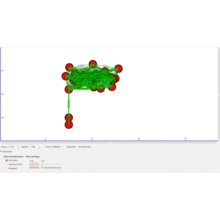Tag Archive: 'ns3 project'
Session Initiation Protocol is an IP based signaling protocol used for establishing, modifying and terminating sessions. During the signaling process, both the peers may initiate similar or controversial signaling messages resulting in Race / Glare conditions. SIP protocol handles glare conditions by transmitting the signaling messages after a random interval of time, within a specified time range. […]
Modeling and prediction of temporal sequences is central to many signal processing and machine learning applications. Prediction based on sequence history is typically performed using parametric models, such as fixed-order Markov chains ($n$-grams), approximations of high-order Markov processes, such as mixed-order Markov models or mixtures of lagged bigram models, or with other machine learning techniques. This paper […]
In current cyber age, almost all the services are being provided to users over the cloud. Many of these services need to be highly available. Since these services require databases, the databases themselves must be made highly available. Redundancy is the technique of doing this. For this purpose Remus and its adaptation RemusDB use complete virtual machine migration to a backup […]
This paper introduces a novel and efficient approach for user cooperation in wireless video multicast using randomized distributed space time codes (R-DSTC), in which the sender first transmits the source packets, and the sender and receivers that have received all source packets then generate and send the parity packets simultaneously using R-DSTC. As more parity […]
Recent advances in information technology bring significant changes to the nature of social interactions and information exchange. Physical face-to-face communications are slowly replaced by online virtual communities. Motivated by this phenomenon, this research investigates how voluntary community involvement and self-disclosure behavior impact a member’s peer-recognition and task performance within a virtual crowd sourcing competition community. We collected secondary […]
Given the wide range deployment of disconnected delay-tolerant social Internet-of-Things (SIoT), efficient resource discovery remains a fundamental challenge for large-scale SIoT. The existing search mechanisms over the SIoT do not consider preference similarity and are designed in Cartesian coordinates without sufficient consideration of real-world network deployment environments. In this paper, we propose a novel resource discovery mechanism […]
In mobile social networks (MSN), with the aim of conserving limited resources, egotistic nodes might refuse to forward messages for other nodes. Different from previous work which mainly focuses on promoting cooperation between selfish nodes, we consider it from a more pragmatic perspective in this paper. Be specific, we regard selfishness as a native attribute of a system and […]
The reliability of peers is very important for safe communication in Peer-to-Peer (P2P) systems. The reliability of a peer can be evaluated based on the reputation and interactions with other peers toprovide different services. However, in order to decide the peer reliability there are needed many parameters, which make the problem NP-hard. In this paper, we propose and evaluate a new fuzzy-based reliability system for P2P communications […]
DC Microgrid Performance Excellence in Electricity Renewal is a major stimulating result of the decade-long non-profit Galvin Electricity Initiative and its objective of demonstrating and promoting truly intelligent 21st Century “Perfect Power” electricity distribution systems. The resulting Performance Excellence in Electricity Renewal (PEER) program with DC Microgrid certification is now being formally administered by the Green […]
There are two types of P2P systems satisfying two different user demands: 1) file downloading and 2) video-on-demand (VoD) streaming. An example of file downloading is the original BitTorrent, and examples for VoD streaming include various commercial P2P-based VoD streaming systems such as that offered by PPLive. We have a hypothesis – by combining a […]

 Click Here to watch our latest output video using NS3 simulator
Click Here to watch our latest output video using NS3 simulator  Click Here to watch our latest projects screenshots using NS3 simulator
Click Here to watch our latest projects screenshots using NS3 simulator